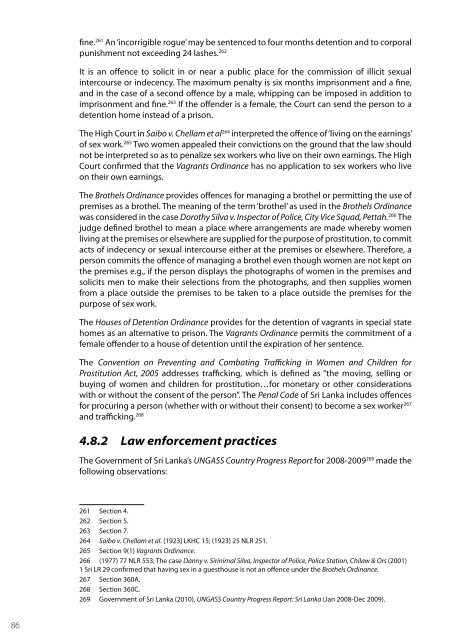SEX WORK AND THE LAW - HIV/AIDS Data Hub
SEX WORK AND THE LAW - HIV/AIDS Data Hub
SEX WORK AND THE LAW - HIV/AIDS Data Hub
You also want an ePaper? Increase the reach of your titles
YUMPU automatically turns print PDFs into web optimized ePapers that Google loves.
fine. 261 An ‘incorrigible rogue’ may be sentenced to four months detention and to corporal<br />
punishment not exceeding 24 lashes. 262<br />
It is an offence to solicit in or near a public place for the commission of illicit sexual<br />
intercourse or indecency. The maximum penalty is six months imprisonment and a fine,<br />
and in the case of a second offence by a male, whipping can be imposed in addition to<br />
imprisonment and fine. 263 If the offender is a female, the Court can send the person to a<br />
detention home instead of a prison.<br />
The High Court in Saibo v. Chellam et al 264 interpreted the offence of ‘living on the earnings’<br />
of sex work. 265 Two women appealed their convictions on the ground that the law should<br />
not be interpreted so as to penalize sex workers who live on their own earnings. The High<br />
Court confirmed that the Vagrants Ordinance has no application to sex workers who live<br />
on their own earnings.<br />
The Brothels Ordinance provides offences for managing a brothel or permitting the use of<br />
premises as a brothel. The meaning of the term ‘brothel’ as used in the Brothels Ordinance<br />
was considered in the case Dorothy Silva v. Inspector of Police, City Vice Squad, Pettah. 266 The<br />
judge defined brothel to mean a place where arrangements are made whereby women<br />
living at the premises or elsewhere are supplied for the purpose of prostitution, to commit<br />
acts of indecency or sexual intercourse either at the premises or elsewhere. Therefore, a<br />
person commits the offence of managing a brothel even though women are not kept on<br />
the premises e.g., if the person displays the photographs of women in the premises and<br />
solicits men to make their selections from the photographs, and then supplies women<br />
from a place outside the premises to be taken to a place outside the premises for the<br />
purpose of sex work.<br />
The Houses of Detention Ordinance provides for the detention of vagrants in special state<br />
homes as an alternative to prison. The Vagrants Ordinance permits the commitment of a<br />
female offender to a house of detention until the expiration of her sentence.<br />
The Convention on Preventing and Combating Trafficking in Women and Children for<br />
Prostitution Act, 2005 addresses trafficking, which is defined as “the moving, selling or<br />
buying of women and children for prostitution…for monetary or other considerations<br />
with or without the consent of the person”. The Penal Code of Sri Lanka includes offences<br />
for procuring a person (whether with or without their consent) to become a sex worker 267<br />
and trafficking. 268<br />
4.8.2 Law enforcement practices<br />
The Government of Sri Lanka’s UNGASS Country Progress Report for 2008-2009 269 made the<br />
following observations:<br />
261 Section 4.<br />
262 Section 5.<br />
263 Section 7.<br />
264 Saibo v. Chellam et al. [1923] LKHC 15; (1923) 25 NLR 251.<br />
265 Section 9(1) Vagrants Ordinance.<br />
266 (1977) 77 NLR 553; The case Danny v. Sirinimal Silva, Inspector of Police, Police Station, Chilaw & Ors (2001)<br />
1 Sri LR 29 confirmed that having sex in a guesthouse is not an offence under the Brothels Ordinance.<br />
267 Section 360A.<br />
268 Section 360C.<br />
269 Government of Sri Lanka (2010), UNGASS Country Progress Report: Sri Lanka (Jan 2008-Dec 2009).<br />
86
















